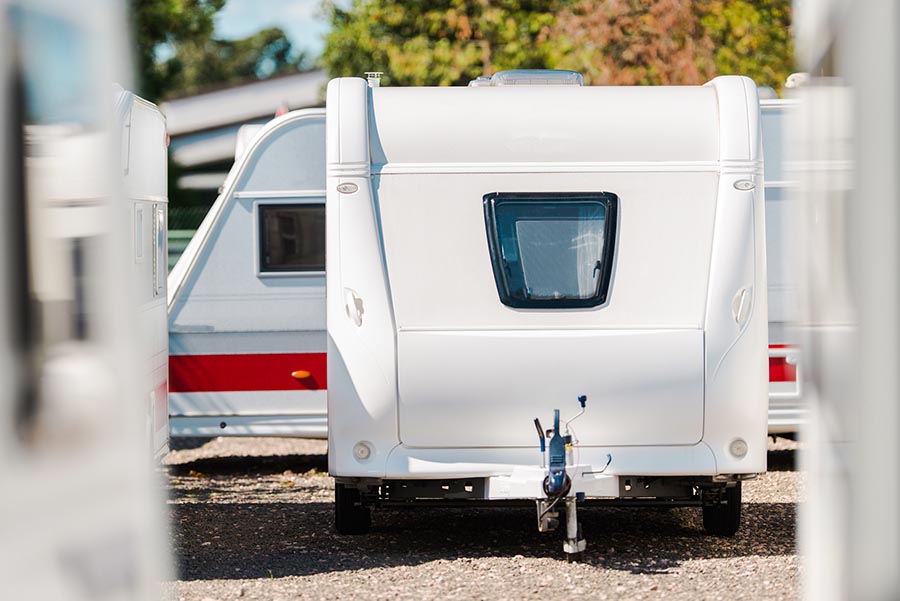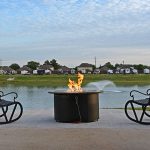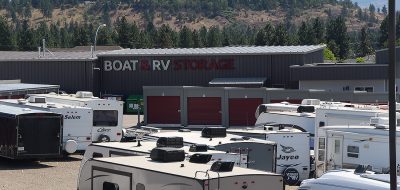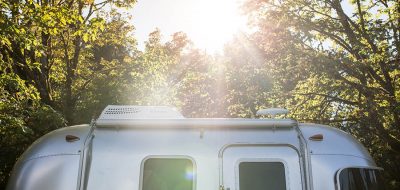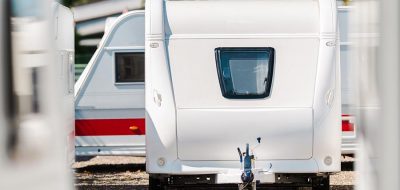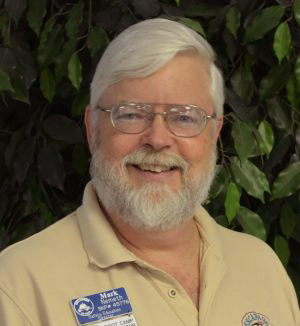 Hi Mark My Words readers! This month, we’ll talk about RV storage, slow drains, toilet odors and boondocking. Remember to send your RVing questions to [email protected]!
Hi Mark My Words readers! This month, we’ll talk about RV storage, slow drains, toilet odors and boondocking. Remember to send your RVing questions to [email protected]!
Hi Mark,
I recently purchased a Winnebago Ultimate Advantage diesel motorhome and have found that the shower drain runs very slowly. Can you recommend a drain cleaner that will open this drain without causing any damage to the plumbing and gray-water tank?
Thanks,
Rick
Hi Rick,
 The slow shower drain may be caused by something other than a clog of soap and hair. I have seen a number of RV shower drains plumbed with no slope or negative slope. If you can gain access to the drain piping from an adjacent compartment or access panel, have a look-see. If the plumbing is not correctly installed, no amount of drain cleaning will fix it. My 5th-wheel shower drain was such a problem that I finally re-plumbed it to correct the slope. It sure worked great after that! If the installation seems OK, then we can assume that it’s a clog. Most drain cleaners that state they are “safe for plastic pipe” will be safe to use in an RV, as long as you flush them out thoroughly after use.
The slow shower drain may be caused by something other than a clog of soap and hair. I have seen a number of RV shower drains plumbed with no slope or negative slope. If you can gain access to the drain piping from an adjacent compartment or access panel, have a look-see. If the plumbing is not correctly installed, no amount of drain cleaning will fix it. My 5th-wheel shower drain was such a problem that I finally re-plumbed it to correct the slope. It sure worked great after that! If the installation seems OK, then we can assume that it’s a clog. Most drain cleaners that state they are “safe for plastic pipe” will be safe to use in an RV, as long as you flush them out thoroughly after use.
I personally have had poor luck with household drain cleaners in my RVs. In most cases, I find it much more effective to mechanically clear the clog. First, use a hemostat or needle-nose pliers to remove built-up hair and gunk from the drain inside the shower. A long wire hook or tweezers will also work. Then, if you can access the shower p-trap, remove it and clean it out. If that’s not possible, you can use a Zip-It drain cleaner (available at any hardware store) to break up any buildup in the drain pipe, and then run plenty of water to flush the drain out. That should get things flowing again!
Mark, when storing an RV for the winter or a short period of time, what is the best position to store the slide-outs, in or out?
Thanks, Roomaster85
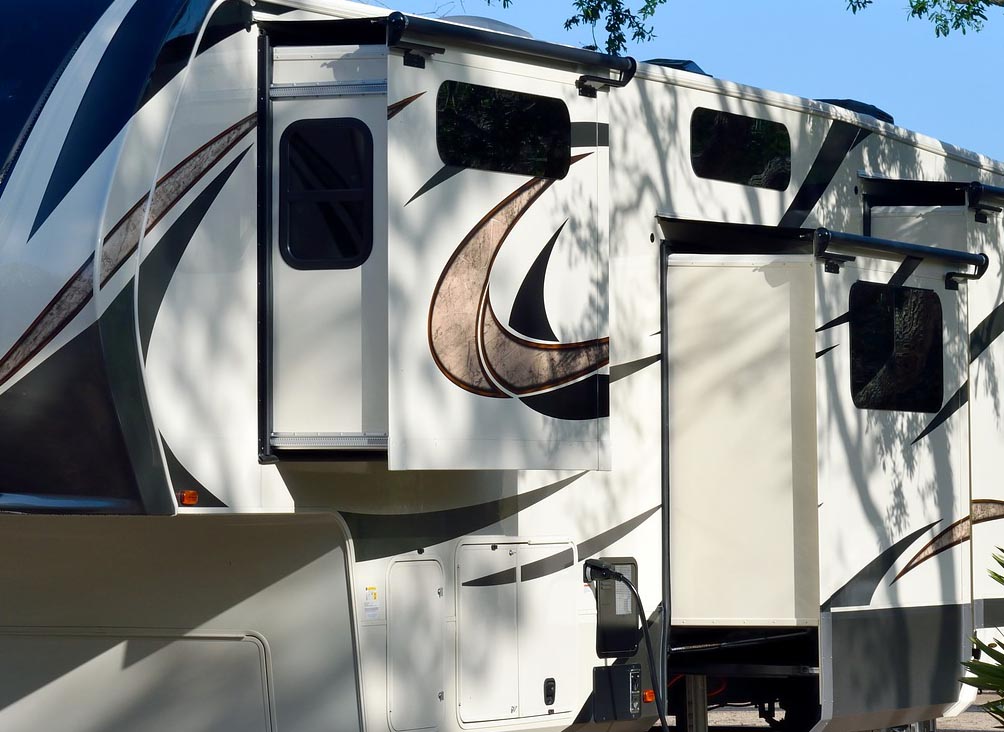
Photo: paulbr75
Hi Roomaster,
Slide-outs are designed to allow the RV to travel down the road in all sorts of weather. To prevent water from getting in while driving in a storm, slide-outs must form a good weather seal when retracted. When a slide-out is extended, the sealing system is much less stout and is designed mainly to prevent water entry in normal rain and wind. Since slide-outs seal better when retracted, I feel it is best to store your rig with the slides in the retracted position. The better seal may also help prevent pests like mice from gaining entry to your RV.
Hi Mark,
We have a 26-foot trailer and have a problem with a bad odor coming from the toilet. We can’t figure out how the odor is getting into the trailer when there is water in the toilet, which should seal any odor from coming up through it. Any ideas?
Thanks,
LT
Hi LT,
The first thing to check is the tank vent on the roof of the RV. The vent allows odors and gases to escape from the holding tank, so make sure it is not blocked. If the vent is OK, then the toilet is our next suspect. Many RV toilets have an internal overflow tube that is designed to drain water into the holding tank in case the bowl is over-filled. On most toilets, that tube incorporates some sort of water trap to prevent tank odors from coming into the coach through the overflow pipe. That water seal can evaporate, and carefully filling the bowl with water to the top can restore the seal by allowing some water to drain through the overflow.
If your toilet is an older AquaMagic IV, that model used a mechanical flapper to seal the overflow pipe, and they are notorious for failing to seal. Later models went to a water-trap design. If you have one of those older toilets (I did, once), the only way to eliminate the problem is to replace the toilet with a newer model. Once you have eliminated the overflow pipe as the odor source, there’s another possibility: RV toilets mount on a flange just like residential toilets. It’s important that the toilet is properly mounted to the floor flange and that a rubber gasket has been used to form an air-tight seal. It may be necessary to actually pull the toilet to check the condition of that seal.
Dear Mark,
Will it harm my RV if I plug my 30-amp RV plug into household 30-amp current, e.g. the dryer connection? This is 3-wire all the way and the dryer plug is 30-amp.
Regards, John
Hi, John,
Under no circumstances should you ever try to plug your 30A RV power cord into a household clothes dryer outlet! The dryer connection is a 240V circuit, and your RV needs a 120V power source. Thankfully, the RV plug is incompatible with the dryer receptacle. Your best bet is to have a qualified electrician install a separate 30A 120V circuit for your RV with the correct receptacle in a weather-tight box where you want to park your rig.
Mark:
We are just getting into the RV life. When traveling down the interstate after dark with fatigue setting in, are we permitted to pull into an interstate rest area and sleep for a few hours like the truckers?
Thanks, Bob
Hi Mark,
My wife and I are taking our first “long” trip (since retirement). We are pulling a 30-foot trailer from Toronto, Ontario, to Myrtle Beach, South Carolina, for a three-week stay. My question: Is it worthwhile staying in campsites on the way down (one-nighters), or is it just as convenient/restful to stay for a few hours at rest-stops or overnight at a Walmart? I’m not into marathon sessions behind the wheel. It’s not safe, and I can schedule an extra day into the trip. This trip would be mid-April, so I don’t know the availability of some campgrounds in the northeastern states.
Best regards,
John
Hi John,
There are times when a full-service campground is the best choice, but there are also times when it makes sense to seek alternatives. You, the RVer, are the best-qualified person to make that call. If you simply need to get off the road for a few hours, then rest stops can be a good answer, but be aware that some states frown on RVers spending the whole night. Rest areas that don’t allow overnight parking will have signs in plain view.
If you prefer to stop for longer than a few hours, there are many other possibilities. Lots of RVers stop overnight at Walmart stores, and it is Walmart’s policy to allow RVers to park wherever local ordinances allow it. Usually, if overnight parking is prohibited, there will be signs, but it’s always a good idea to check with the store staff or manager just in case. Park out of the way and stay one night only.
Don’t “set up camp” at Walmart. If you need to stay several nights, a campground is a much better choice. Other possibilities include chain restaurants (like Cracker Barrel), gas stations, casinos, town parks and malls. Always ask permission before you park, and don’t block access to any businesses. You can also park overnight at truck stops, but be courteous and park as far out of the way as possible. Truckers, who are trying to make a living, need the truck spaces to make their mandated safety stops.
There are a number of printed guides and Internet resources available. Just Google “free camping” and you’ll be amazed at the resources out there! Keep in mind, wherever you camp, rules of common courtesy apply!

